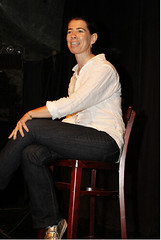Jenni Wolfson is a woman of many talents with a passion for human rights. Scottish born, she’s a onetime resident of the East Village, having lived on East First Street as well as East 13th Street. She will perform her monologue “RASH: What If Your Dream Job Could Kill You?” next month at Theater 80 on St. Marks Place as part of the All For One Theater Festival. The play tells a profound, humorous, and hopeful tale about her 12 years as a UN diplomat – three of which were spent in post-genocide Rwanda.
Why did you decide to go into human rights?
I am partly wired that way, and the other part was my environment. Growing up, I experienced a lot of anti-Semitism in Scotland. The Scottish Jews were one-tenth of a percent of the entire population. Shocking images of the Holocaust and the direct experience of being discriminated against influenced me. I even went undercover in Russia to help Soviet Jews escape. It was becoming clearer and clearer I would not work for the Royal Bank of Scotland.
What brought you to Rwanda?
Rwanda was the genocide of my generation. I felt compelled to go there. I was a 20-something-year-old white chick going to a country under the umbrella of the UN, even though they never helped try and stop the genocide. It was ambitious. I investigated cases of killings, rape and torture. I had an opportunity to access every prison and detention camp. Over time I was able to build very important relationships with the military and other government officials, which was the key to my success. Plus, I’m an adrenaline seeker.
Did you make a difference?
Margaret Mead once said, “Never doubt that a small group of thoughtful, committed citizens can change the world. Indeed, it is the only thing that ever has.” Although it was hard to measure change on a daily basis, since in human rights terms, change happens over months and even decades, I don’t think I would’ve done it if I didn’t feel that I wasn’t making a difference. Sometimes we measure the change in small increments.
What do you want your play to accomplish?
I would like to give people enough insight to make an unfamiliar world familiar. I’d like people to step out of their comfort zone. Every job I’ve ever applied for seemed terrifying, but I still went for it. I think the play opens people’s eyes to a world they rarely see and it’s truly shocking, but it is digestible because I tell it through my own very personal story. It’s also got funny moments too, because even in the midst of tragedy, some things do appear absurd.
How did you realize your story should be made into a play?
It kind of happened by accident as I took a writing class to be able to do something creative and different from my day-to-day life. It took on a life of its own. Although the experience I describe in Rwanda is so different from most people’s lives, everyone can relate to the themes of family, love, identity, and conflict. Going on stage is an amazing and terrifying experience for me. As well as performing at festivals, theaters and conferences, I’ve also performed at universities and schools — I like that audience a lot because they are very open and still considering what to do with their lives.
“RASH” at the St. Mark’s Theater (80 St. Marks Place) on Nov. 13 and 20. Tickets $20. Visit http://www.afofest.org




